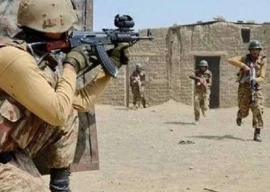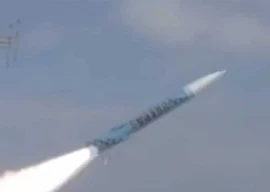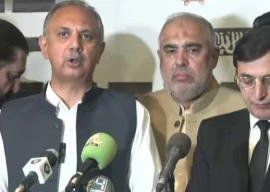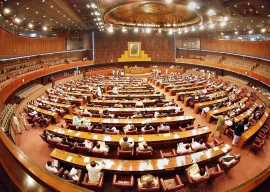Pakistan’s failure to eradicate polio has been largely viewed through a political and security lens. The case of Dr Shakil Afridi, accused of trying to take blood samples from the Bin Laden family under the guise of polio vaccinations, and militant groups’ opposition to vaccinations have been the centre of focus. Despite the World Health Organisation’s (WHO) categorical denial of Afridi being linked with the polio campaign, the stereotypes persist. But what has also gone unnoticed is how Karachi contributes to the dire state of affairs.
Karachi is a game changer because it has had a unique role in the transmission of the virus. Until last year, it was the only mega city in the world that was a high transmission zone for polio. The Gadap area was among the only three reservoirs of polio in Pakistan from 2007 until mid-2011, along with the Federally Administered Tribal Areas and the Quetta Block (Qilla Abdullah, Pishin and Quetta) in Balochistan. However, WHO’s chief coordinator for polio eradication in Pakistan Dr Elias Durry told The Express Tribune that Karachi is on the road to recovery because no cases have been recorded this year.
Danger zone
But Karachi is a problematic area simply because of the refusal of some areas to allow a vaccination drive to go through. Gadap, Baldia and Gulshan-e-Iqbal are black spots because parents are refusing to allow their children to take the oral polio vaccine (OPV). To boot, environmental sampling showed the presence of the virus in sewage. Gadap was the worst as it was among the three reservoirs of polio in the country.
Water woes
In 2011, nine cases of polio originated from Karachi, six more than 2010. The reason why an outbreak in Karachi is more alarming than an outbreak in any other part of the country is because Karachi is a reservoir.
When there was an outbreak of polio in Punjab in 2009, generic sequencing of the virus showed that all the cases had originated from Karachi. The motorway police was made part of the polio campaign and since then teams have been deployed for the immunisation of children on the roads. Teams are also deployed at the railway stations but officials are now mulling a change in strategy and are considering placing teams inside train compartments instead of at stations.
However, Dr Durry said that Sindh shows signs of improvement. Since this June, environmental sampling has shown that Gadap is free of the virus. Similarly, Gulshan-e-Iqbal’s environmental samples have been testing negative since the 16th week of 2012 and Baldia from the 50th week of 2011.
Refusals
A health official speaking on the condition of anonymity said that a neighbourhood cannot be accessed because of two reasons - inaccessibility or refusal. The polio campaign has witnessed three types of refusals in Pakistan; religion-based refusal, demand-based refusal and medical misconceptions.
As a multiethnic city, Karachi has a mix of all three types. According to Waseem, who works as a vaccinator, sometimes people say no because they think it will lead to infertility while others say no for religious reasons. People have also boycotted the vaccine on the condition that they want electricity supply first. Dr Durry told The Express Tribune that in order to improve the ground situation, they are hiring locals to carry out immunisation. In Gadap, international agencies including the WHO have revised their strategy and enlisted about 90 women who are residents of the UC-4 for the campaign. Durry said that they are not only trying to improve service delivery but also working to change negative perceptions by working closely with religious and community leaders and elders. Related health campaigns with the help of Rotary International, such as for cleanliness, are also ongoing to provide an incentive to people.
Drop by drop
The frequency of the vaccine administration is every four to six weeks. In the last campaign held from July 16 to July 18, 21,385 teams of vaccinators were formed to administer polio drops to 7,498,143 children in Sindh, including 2,284,956 children in Karachi alone. The next campaign is in September. A team can reach 150 children per day.
A long road ahead
There is a long way to go before Karachi is polio-free. The recent attack on a WHO doctor in Karachi served a blow and raised questions about security. Dr Durry warns, “If the current situation continues when the vaccinators are threatened, all of the success of Karachi could be derailed, because the success we have is a fragile success.”
WHO and Unicef also issued a statement on Saturday over the killing of Muhammad Ishaq, a local community worker who was part of the polio eradication initiative. In a statement, they noted that immunisation activities were suspended in Gadap earlier this week after a shooting incident injured two WHO staff members who were part of the campaign. However, they affirmed that the partners of the Global Polio Eradication Initiative remain committed to supporting the government and the people of Pakistan in their efforts to eradicate polio.
Published in The Express Tribune, July 23rd, 2012.
COMMENTS (2)
Comments are moderated and generally will be posted if they are on-topic and not abusive.
For more information, please see our Comments FAQ


1730752226-0/Untitled-design-(35)1730752226-0-165x106.webp)







1726140338-01730723472-0/Untitled-design-(42)1726140338-01730723472-0-270x192.webp)




1730706072-0/Copy-of-Untitled-(2)1730706072-0-270x192.webp)
3 bombs diffused in Karachi, each of above 12 KG - Any relation to the Polio campaign?
#StandUpAgainstPolio and support us. The government nominated international cricketing superstar Shahid Afridi as polio celebrity champion. Follow us on @AfridivsPolio